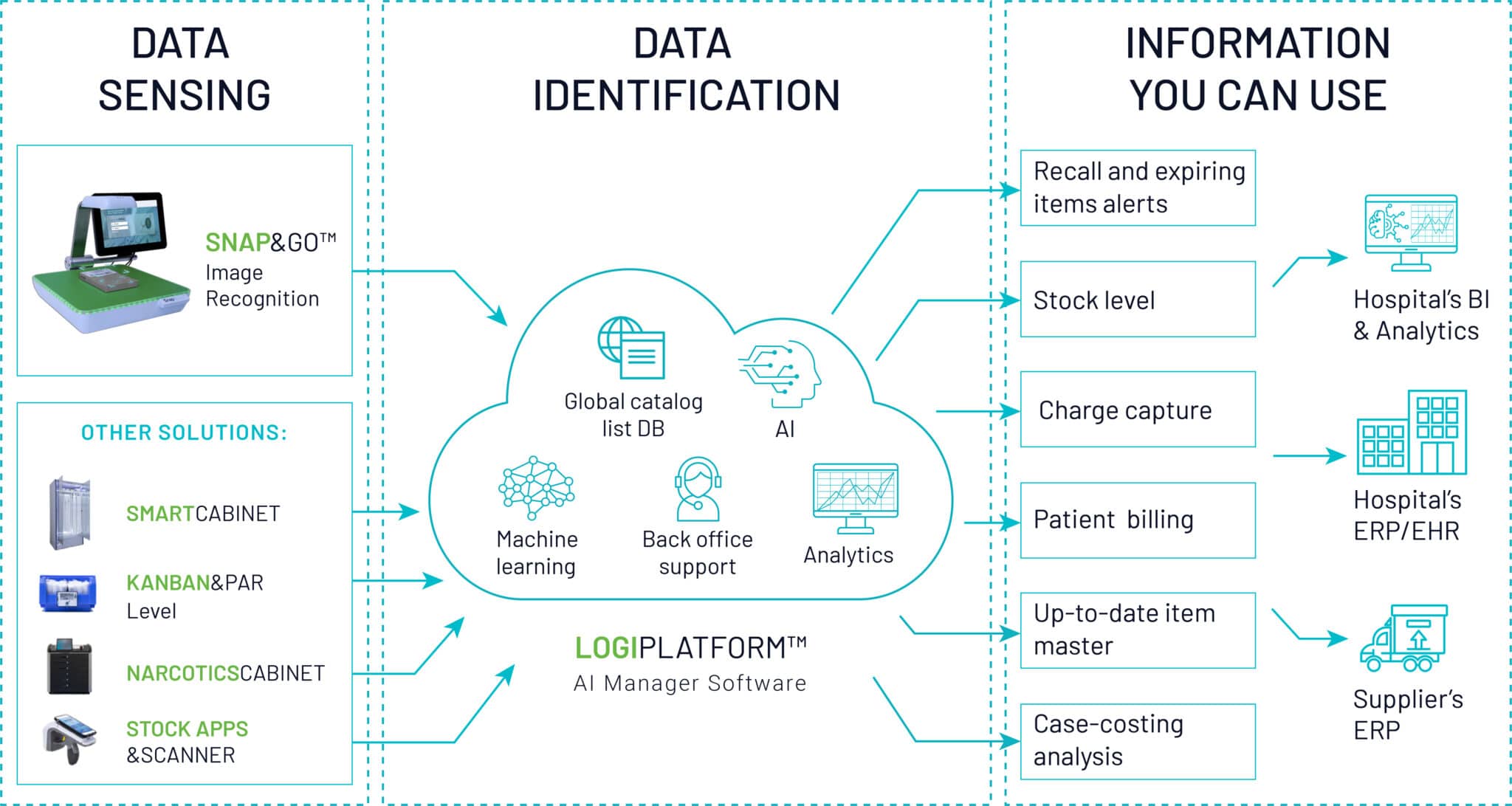What’s inside:
This article looks at the increasing role that AI technology plays in hospital inventory management. Read on to discover:
- Why healthcare providers are using AI and machine-learning algorithms to automate and streamline inventory management tasks.
- How these new technologies can help to identify patterns and trends in medical inventory usage, in order to make predictions about future demand.
- The connection between artificial intelligence and improved patient care.
Technology is changing the way we manage healthcare inventory. With the help of AI, we can now keep track of medical supplies’ stock levels with accuracy and ease.
Following the challenges of navigating disrupted supply chains, the healthcare sector is recognizing the urgent need to embrace automation for improved efficiency and resilience.
Technology is taking center stage in the drive to resolve healthcare supply chain issues, with Artificial Intelligence (AI) and Machine Learning (ML) being seen as the radical solution that is going to change medical inventory management as we know it.
With new, transformative technologies revolutionizing the development and modernization of inventory management, let’s take a look at the effect that AI technology is having on healthcare inventory management systems.
What is Artificial Intelligence (AI) in healthcare?
AI in healthcare describes the use of AI or machine-learning algorithms to go beyond natural human intelligence. These algorithms are a set of rules used in calculations to solve problems or perform tasks. Artificial intelligence offers new ways to sieve through and interpret mass data, providing clear and useful information. The technology uses logic and analyzes patterns to gain insights above and beyond what the human brain could achieve.
Improving today’s inventory management:
In the healthcare setting, AI is used to support better operational and clinical decision-making.
Operationally, AI technology captures and interprets healthcare data in order to improve inventory visibility, add automation and streamline workflows. As well as improving the day-to-day management of medical supplies artificial intelligence technology is an excellent tool to support future planning.
Predicting future medical inventory requirements:
AI data interpretation helps healthcare providers to gain an understanding of future inventory needs – it can be used to forecast stock levels by analyzing historical data and making predictions about future demand. This information can then be used to schedule deliveries based on need, ensuring timely, accurate restocks and an end to stockouts. By applying AI technology and predictive analytics to the hospital inventory supply chain, hospitals can achieve data-based forecasts and accurate inventory planning which will reap many benefits, including better hospital supplies management, reduced costs, and improved operational efficiency.
AI covers several different areas – machine learning, deep learning algorithms, computer vision, natural language processing, and robotics.
As healthcare providers strive to find technological solutions to their operational challenges, the market is responding with health-tech tools that are powered by AI and ML technologies.
So, what is the role of data within modern healthcare management? How can it influence the practicalities of management?
The diagram below shows how, ‘Snap & Go‘, an automated POU data capture system, uses cloud management software that incorporates AI, machine learning and analytics. Together these technologies are used to process the data collected and produce meaningful supply chain management information.

The relationship between data capture and data analysis
AI’s emerging capabilities and wide application across a range of business sectors will see it revolutionize the workplace in the coming years. But its particular suitability for the healthcare setting has been noted and is leading to a growing demand for smarter data capture solutions and analytical software.
Health information management relies upon effective tools and software. It is the combination of two elements – data capture + data analytics, that work together to transform raw data from multiple sources into useful information.
Healthcare data capture tools are used to extract and digitally record item data. This can then be identified, processed, validated, and analyzed.
For AI technology to work, capturing healthcare information needs to be accurate, in terms of collecting full data from all items and recording all the relevant data sets required.
-Intelligent automation systems connect data sensing tools to central management software
– it is the interaction between data capture and data analysis that results in meaningful insights
Machine Learning (ML) in healthcare automation
In addition to AI, Machine Learning (ML) is also being used in healthcare automation. ML is a type of AI that enables computers to learn from data. This data can be used to identify patterns and trends.
AI and ML can be utilized to improve a variety of healthcare inventory management tasks, such as:
- calculating optimum stock levels for each product
- maintaining inventory levels based on demand for a particular item
- understanding the specific needs and inventory requirements of each department
- achieving a streamlined, balanced inventory
- planning future inventory needs
AI technology is revolutionizing hospital inventory management. New technology is adding efficiency to healthcare supply chain workflows by automating many of the tasks associated with materials management.
AI-powered hospital inventory management solutions are providing significant benefits to healthcare organizations in terms of increased efficiency and cost savings. In addition, AI technology is helping to improve patient care by providing real-time visibility into inventory levels and trends. As the use of AI technology in hospital inventory management continues to grow, it is expected that these benefits will become even more pronounced.
The image below shows the IDENTI Platform which is the managing software for all our products. It provides real-time dashboard metrics, reports and meaningful data insights.

How AI Technology Can Improve Inventory Management
AI can automate routine tasks, removing time-consuming, manual, and repetitive supply chain tasks from the workload of busy nurses and over-stretched materials management teams.
Inventory management systems utilizing artificial technology will result in workflows that are quicker, more efficient and eliminate tedious, time-consuming tasks.
Automated inventory management solutions can provide real-time visibility of stock and consumption. What AI brings into the mix is the ability for advanced analysis of this data to support informed decision-making. When decision-making is data-based and accurate it lowers costs, reduces workload and improves patient safety.
In addition, the predictive models that AI can create can be used to make better observations about future demand, patterns, and trends – which will lead to better, more informed planning and decision-making.
All of these features will result in a more efficient and effective hospital inventory management system, saving time and money, and improving patient care.
AI powered inventory management software and the impact on patient safety
Nowhere is it more crucial to keep on top of inventory demand than the hospital setting. Stockouts can have a direct impact on patient care, causing delayed surgery and health deterioration.
AI and ML are helping healthcare providers to meet the level of demand by predicting what will be required and ensuring inventory orders cover the product ranges and volumes needed, based on in-depth analysis of usage. Over time AI will have more and more information to work from and the sophistication of the analysis will become even more accurate.
Predictive inventory forecasting is a key enabler for balancing stock levels and ensuring a better patient experience.
AI tools for perioperative supply chain tasks
Given the current pace of digital transformation, it’s clear that data interoperability is becoming ever more important. As the medical inventory supply chain gears up for the future, hospitals and surgery centers should ensure that all their systems and tools integrate with hospital systems. Once this is achieved all that crucial data is retained, analyzed, and interpreted by AI software.
The image below is of Snap & Go POU data capture solution which integrates with the EMR, MMIS, and ERP. Data collected at the point of use can therefore be used to inform restock orders, medical billing, and medical records. One data collection tool that shares the data collection with all relevant hospital systems.

The value of intelligent data capture
Contrary to scaremongering, software with intelligent data capture capabilities isn’t intended to replace humans, the goal is that AI-driven data capture will increase the automation of routine tasks freeing up the healthcare workforce for higher value duties that require the human touch. For in truth, the value of AI technology is in the potential for partnership – between minds and machines. Data alone is ineffective. It needs to be interpreted and used by a thinking, feeling human being, while all the time being mindful of the ultimate beneficiary – the patient.
AI will, of course, change the face of the healthcare sector. It will be changing the way that every sector operates. The healthcare sector has though, been singled out as having many applications for this technology. Inventory management is just one small area that can benefit from artificial intelligence. Soon it will likely be integrated into every department and workflow to some degree.
During this time of major technological transition, hospitals and surgery centers need to reimagine and reinvent their work processes.
The future will be about reviewing job design, optimizing automation and using human resources wisely. The new AI-powered healthcare setting will be super-efficient and make smart use of resources to support an improved patient experience and better patient outcomes.
Clinically integrated supply chain management
Healthcare providers need to rethink how they use both technology and teams. The future will require a multi-disciplinary, integrated approach. Gone are the days when organizations could work in silos, in blissful ignorance of wider organizational issues. Modern healthcare relies upon cross organizational thinking and the sharing of information.
With this approach organizations can take a holistic view and focus on the full range of performance drivers, as they strive toward excellence.
Inventory management is a cross-cutting workflow that has a clinical and organizational impact. The data captured as inventory moves through the supply chain will be used for a wide range of organizational activities. For example, implant tracking is required for regulatory compliance, recall management, medical billing, inventory management, and more. It makes sense, therefore, to consider the full journey of inventory when deciding upon the systems and tools needed for clinical performance as well as operational effectiveness.
The role of technology in integrated healthcare
Technology is supporting the interprofessional healthcare model, where there is better communication and collaboration between disciplines. Integrated health care requires the sharing of information to support optimum patient care. AI technology is not just enabling the transparency of data, but it is also resulting in more quantitative and qualitative information that has the potential to improve performance.
Technology is blurring the lines between the traditional silos and staff are increasingly learning to take a more holistic view. Nursing staff need to capture usage in order to achieve accurate patient records while at the same time ensuring that all chargeable items are listed so that full reimbursement can be claimed.
Hospitals are healthcare businesses. They need to take heed of a whole range of financial factors, like costings, wastage, resource management, billing and revenue generation. Although patient care is the ultimate goal, successful healthcare organizations will run a lean ship that minimizes the cost of surgery and optimizes revenue.
Once interoperable systems, powered by artificial intelligence, are in place
the data crunching capabilities of healthcare providers will explode,
and the application of all of this dramatically improved data crunching activity
will underpin safer, optimized healthcare.
The future of high-tech healthcare
New technologies are helping organizations to unleash the full potential of the data they collect in order to improve business processes and performance.
The future’s leading healthcare providers will be using technology in ways that were only dreamed of in the past – today’s tools and advanced capabilities were the stuff of science fiction movies just a few years ago.
There’s no going back. AI technology is the future of healthcare management. It’s time to get ready for the new era and embrace ‘next generation’ systems and tools that will be able to operate within the new infrastructure.
AI powered solutions for the surgical suite
IDENTI Medical produces innovative inventory management solutions for the healthcare sector – combining cutting edge data sensing tools with sophisticated cloud software and data analytics.
Our AI management software powers an innovative range of data sensing tools, that help hospitals, ASCs and medical centers to solve health management challenges at the point of use.
Our award-winning medical inventory management tools are designed for clinicians but produce all the meaningful analytics that healthcare management needs to drive forward enhanced performance.
Clinician-friendly tools + vital data analytics = optimum patient care
Contact us to find out more about IDENTI’s AI powered data sensting tools.








